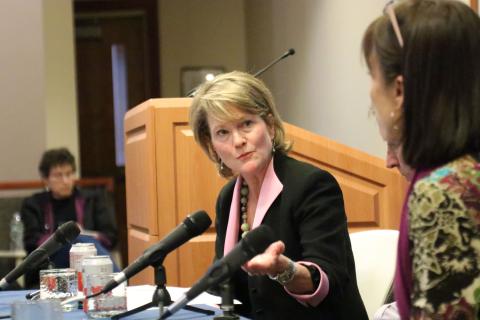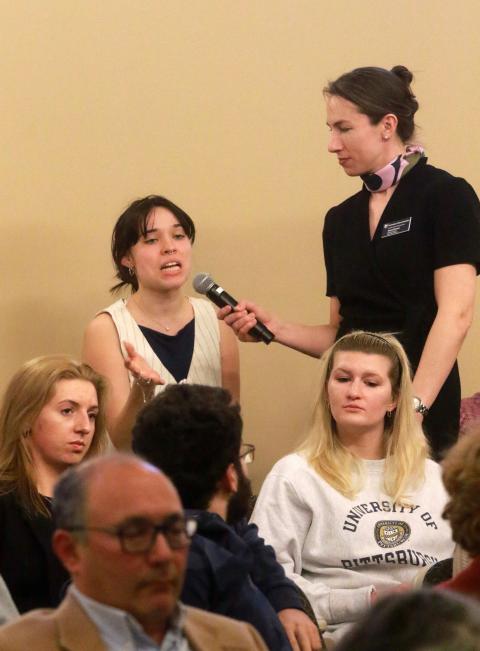The Search for Affordable Healthcare: 'People deserve not to go bankrupt if they go to the hospital.'
The healthcare system in this country has become increasingly costly and complex despite efforts at reform. During a recent panel discussion at UNH Franklin Pierce School of Law, Professor of Health and Life Sciences Law Lucy Hodder and KFF Health News reporter Noam N. Levey discussed the root causes of these high costs and the human consequences, including medical debt afflicting about 100 million Americans. Rudman Center Community Engagement Director Laura Knoy moderated the conversation.
The event was presented by the Warren B. Rudman Center for Justice, Leadership & Public Service and the Health and Life Sciences Law Programs of UNH Franklin Pierce School of Law. To watch the video of this event, produced by Concord TV, visit here. Visit here for a list of resources and articles of interest. Excerpts in this piece have been edited slightly for clarity. Photos by Allegra Boverman.
This event was generously sponsored by the Peter G. Peterson Foundation.
For decades leading up to the Affordable Care Act, the clarion call was that people deserve to have health insurance. I think the clarion call now should be: People deserve not to go bankrupt if they go to the hospital. If that’s the north star for people, that will catalyze a different kind of conversation. -- Noam Levey

Prof. Lucy Hodder, KFF Health News reporter Noam N. Levey, moderator Laura Knoy.
The causes of soaring healthcare costs include out-of-control prescription drug prices, pharmacy benefit managers who negotiate in secrecy and can leave patients out of the equation, hospital and insurance industry consolidation, which can lead to monopolies, facility fees on outpatient services, workforce challenges, and a vast and complex system of care.
Prof. Hodder identified an additional challenge – and potential barrier to reform: “One of the really important issues is to figure out how to build trust in this world of misinformation, where we don’t even trust basic public health data,” she said. Recent executive orders in some cases have resulted in limiting access to federal healthcare data. “CDC data is being taken down from the web sites and WHO is no longer something our government is respecting. And it’s really hard to build trust in the information, so that we can decide what type of regulation, what kind of system, we are willing to go to.”

Prof. Lucy Hodder, KFF Health News reporter Noam N. Levey, Rudman Center Community Engagement Director and moderator Laura Knoy
The Affordable Healthcare Act: A consequential change that has yet to fulfill its promise:
Noam Levey: It was an extremely divisive debate. But I think those who worked in healthcare policy felt that something really important had happened. And I think something really important did happen. At that point there was this feeling among a lot of people I was talking to, whether they were academics, whether they were people who worked in policy, ran hospitals, insurance companies, that there was this moment when we’re finally going to do something. I can tell you that 15 years later many of those people are very, very disheartened about where we are.
The clarion call should be protecting patients’ financial security. For decades before the ACA the clarion call was: People deserve to have health insurance. I think the clarion call now should be people deserve not to go bankrupt if they go to the hospital. If that’s the north store for people that will catalyze a different kind of conversation.
Prof. Hodder: It takes a powerful force to try and get our really big healthcare industrial complex to try and save money and to make sure we spend the money where we need it most. That’s not to say there are not a lot of really great actors; we do have a real effort to get people insurance. The question is how do we make sure -- and who is responsible for making sure – that we’re spending where we’re supposed to spend, and people get the care they need.

Prof. Lucy Hodder
I commonly say we did half the job. We got people affordable health insurance under the ACA. And then we tried really hard to reduce the costs of care, and it’s just complicated; people didn’t really come around the table to do it. -- Prof. Lucy Hodder
Budget Conversations in Congress, Potential Medicaid Cuts:
Noam Levey: I would wager that Medicaid will survive this debate. There will be some tinkering, but the program is secure in large part because an enormous number of people -- politicians, doctors, patient advocates and others -- rallied and told members of Congress: Don’t touch this program. This program has a become a political force in and of itself.
How federal budgetary decisions might be felt here in NH:
Prof. Hodder: There’s a lot of uncertainty. In New Hampshire, we depend on the federal dollars in our healthcare system. According to the New Hampshire Insurance Department, we spend about 13 billion a year on the healthcare system. A large portion of that is from federal sources, for many good reasons. We have federal dollars paying for insurance for 14% of us who are on Medicare. And that’s growing. We’re an aging state. Over 10% of our population is covered by Medicaid. Over half of our Medicaid budget is federal.

Audience members at "The Search for Affordable Healthcare."
The Magnitude of Medical Debt:
Noam Levey: It’s huge. I think people don’t understand how much worse it is than you may realize. If you ask people: Do you have a bill you weren’t able to pay? Do you have a bill you had to put on your credit card, that you took out some kind of a loan for and maybe a second mortgage, that you borrowed from friends or family for? You put all that together and you get 40 % of US adults, 100 million in this country, have some form of healthcare debt. It’s devastating.
What is really striking about healthcare debt in America is that, if we were sitting here 15 years ago, before the passage of the Affordable Care Act, and we were talking about the burden of medical bills on people’ lives, we’d be talking primarily about people who didn’t have health insurance.
It was that lack of health insurance that drove the ACA, that led to the expansion of Medicaid, the creation of ACA marketplaces, but now medical debt in America is a problem of the insured. So most people who have debt in this country got it even though they have health insurance. -- Noam Levey
States Seeking Solutions:
Prof. Hodder: In response to the high cost of insulin, California said we’re going to manufacture insulin ourselves. Regarding New Hampshire, we haven’t made a lot of progress. We established a Prescription Drug Affordability Board; it is doing a great job, but now it is under assault. We need federal help to address the burden of rising prescription drug costs. We just haven’t gotten it.

Rudman Center Executive Director Anna Brown takes an audience question.
Noam Levey: There have been efforts by some states to ameliorate the worst problems with patients going into debt. Some states have put limits on hospitals suing patients or putting liens on their homes or garnishing their wages, or have stopped medical bills from being reported on peoples’ credit scores. In California and New Mexico, their plans through the ACA exempt some services from deductibles, particularly primary care. It’s the notion that if you reduce the cost of primary care, you’re more likely to get treated for a smaller thing and save money down the road.
We need to continue to work together to find solutions. People burdened with medical debt should not be the ones to suffer because we can’t find solutions to the healthcare affordability crisis. -- Prof. Lucy Hodder
